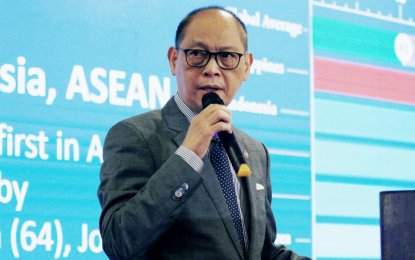Business and Economy
Gov’t considering changes in 2019 budget proposal

Diokno, however, is not worried about a deceleration in government spending, pointing out that this can be prevented if agencies begin the process for awarding or pre-procurement of projects early. (PNA File photo)
MANILA — The Duterte administration is sticking with its proposed cash-based budgeting system for 2019 but Budget and Management Secretary Benjamin Diokno said they are planning to extend the payment period for projects.
The proposed PHP3.757-trillion national budget for next year has a validity of one year, a change from the two-year validity under the obligations-based system.
Economic managers said this reform, which is given a three-year transition period, will allow more efficient use of funds.
However, lawmakers have questioned the new budgeting system, saying it will negatively impact projects.
Diokno said they are considering extending the payment period for projects to six months to June 2020 instead of the initial proposal of only three months or until March 2020, since 2019 is an election year.
“For projects, we agreed that we will extend it to the end of June. For equipment, like computers, cars, that has to be settled within the first three months of the year,” he said.
Since next year is an election year, there will be construction ban for government projects.
Diokno, however, is not worried about a deceleration in government spending, pointing out that this can be prevented if agencies begin the process for awarding or pre-procurement of projects early.
He referred this as “short of awarding” the project since agencies must still await the “Notice to Proceed” in order to implement those projects.
“You can do the whole process. You can choose the contractor but not award it. Once the budget is approved, you can sign the contract by January second and that’s it.
That’s no longer covered by the ban,” he said.
Under the proposed national budget for next year, some agencies were given a lower budget, which Diokno explained, was due to underspending in past years based on the findings by the Commission on Audit.
He explained that a “supplemental budget is a possibility but not a certainty”, adding that there should be an “overwhelming justification” for this purpose.
He said Malacañang must first identify funding source for a supplemental budget, which can be disbursed in December if funds are really available, but it will take effect only next year.
“So we cannot just pass the supplemental budget to Congress without telling them the source of funding. So if Congress will pass all tax measures, then there’s a possibility,” he said.
“Let them do the tax reform measures first so we will have a basis for a supplemental budget,” he stressed.
To date, lawmakers are discussing several tax reform measures proposed by the Department of Finance, such as Package 2, 3 and 4.
Package 2 calls for lower corporate income tax and broader tax base by modernizing tax incentives; Package 3 calls for the reform of property taxation and Package 4 calls for rationalization of capital income tax and on other financial instruments.
Package 2 is seen to be revenue-neutral while the latter two packages are expected to give the government additional revenues.
Diokno said lawmakers have welcomed economic managers’ proposal because they all have responsibilities and “we want to act like a team”
“This is an opportunity for all of us to make a difference. I’ve seen this after 32 years, after EDSA 1 …We are again in a nice place right now. We can have a nice place if we work together,” he added.





















